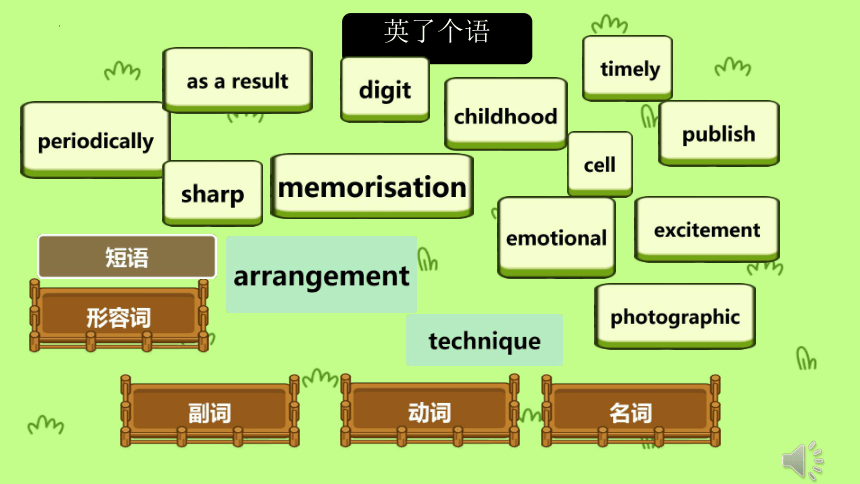(
课件网) 英了个语 Unit 9 Lesson 3 Key words 1. arrangement (n.) 计划;安排 2. childhood (n.) 童年,儿童时代 3. emotional(adj.) 情感上的,情绪上的 4. excitement(n.) 兴奋,激动 5. as a result作为结果 6. photographic adj. 详细准确的;照片的;摄影的 7. digit n.(0-9的任何一个)数字 8. publish(v.) 出版,发表,刊登 9. sharp adj. 急剧的,锋利的 10. timely adj.及时的,适时的 11. cell n. 细胞 12. periodically adv. 定期地 13. memorization/ memorisation n. 记忆, 背诵 14. technique n. 技巧,手法 Unit 9 Learning Lesson 3 The Secrets of Your Memory 1. To read a text about memory 2. To read for details and correct false statements 3. To understand the main theme of each paragraph 4. To discuss tips on memory improvement Lead-in: Memory games Let’s play. How good is your memory letter, serious, heart, envelope, page, arrow, 2,000 years, scarf, rabbit, five o’clock, empty, hat, ox, hair, amazing, world, half an hour Look at the words in the box for one minute. Then write down all the words you can remember quickly. 00 01 : Pre-reading Ⅰ Which of the following things do you find easy to remember Why names and faces facts and arrangements stories things that happened long ago things that happened recently numbers: telephone numbers, passwords... Pre-reading: If you were going to meet a memory expert, what questions would you ask him / her Examples: Does age play a role in the human’s brain ability to sore and recall information Is there any special food that helps memory What can we do to improve our memory Ⅱ Fast Reading Fast reading: Read the text quickly. Does the text answer any of your questions Share with us! 1. Why can I remember events in my childhood but not what happened last week 2. Do some people really have a photographic memory 3. Why do I forget the new words that I learnt yesterday 4. I’m 16, but I sometimes forget things. Is my memory getting worse Ⅲ Intensive Reading Read the text again. Write T (true) or F (false). Correct the false statements. We remember certain events in our childhood, because we experienced many of them for the first time, and we felt strongly about them at the time. When we tell a story many times, we forget important details. We can remember them clearly. 3. Stephen Wiltshire has a photographic memory because he can draw a detailed picture of a city from memory after flying over it. He is good at remembering particular things but does not have a photographic memory. 4. It has been proved that some people have a photographic memory. No one has been proved to have a photographic memory. 5. The sharpest loss of memory occurs during the first five days. The sharpest loss of memory occurs during the very early period after learning. Our memory starts to get worse after the age of 25. 6. Our memory starts to get worse in middle age. Here is a video about Stephen Wiltshire who has special mental abilities. Watch it and talk about what you find the most interesting abo ... ...

